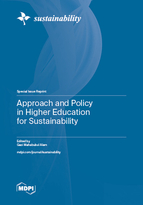Approach and Policy in Higher Education for Sustainability
A special issue of Sustainability (ISSN 2071-1050). This special issue belongs to the section "Sustainable Education and Approaches".
Deadline for manuscript submissions: closed (31 October 2023) | Viewed by 48923
Special Issue Editor
Interests: education and development; education Policy and governance, sustainable education and sustainability in education
Special Issues, Collections and Topics in MDPI journals
Special Issue Information
Dear Colleagues,
In general, scientific-ism and modernization are often blamed for damaging the genesis of the sustainability of nature, which will cause a grave adverse impact in the long run. Within this discourse, institutions of higher education are also rigorously criticized for their role in supporting the developing sustainability crisis by being exceedingly responsive towards the commercialization of science and modernization.
In the era of the fourth industrial revolution, isolating scientific-ism and modernization while addressing the sustainability crisis is not feasible. Consequently, science and technology have to undertake a prime role in innovation that ensures the best possible sustainability worldwide. Understanding of logic and philosophy serves as the epistemological underpinning in discourse regarding paradigm transformation towards science and innovation. This tenet supports the idea that complete development that includes sustainability as a core agenda deserves the substantial coordination of knowledge within different branches such as science, technology, social sciences and the arts. Hence, the role of institutions of higher education has become vital to ensure sustainability in the era of scientific-ism and modernization.
In playing the above-mentioned critical role, ideally, the higher education sector should concentrate on innovation and sustainable and natural science. However, in the 21st century, universities are experiencing enormous competition on local, regional and international levels. Moreover, competition between public and private sector universities have also misbalanced many “novel concepts” due to the hard and pragmatic reality of this competition.
These days, higher education and research have become commodities without adhering much to the concept of public good. In order to develop a balance between novelty and reality, public policy plays the most important role, which is the core agenda of this SI.
The aim of this SI is to contribute to sustainable policy frameworks with regard to the higher education sector that develop an obligatory atmosphere, so that institutions of higher education adhere to the agendas of sustainable science and innovation and also ensure a decent expansion of science, innovation and modernization with multi-disciplinary tolerance and coordination. Without rigidly limiting authors to the scopes listed below, the SI collection should mainly focus on:
- Sustainable innovation, science and culture in higher education;
- Campus sustainability and the role of green campus;
- Policy and legislative framework for sustainable innovation, science and culture;
- Sustainability challenges experienced within different types of universities;
- Impact of globalization in higher education on the sustainability crisis;
- Commodification in higher education and research and its impact on sustainability crisis;
- Global phenomena in higher education vs. local reality in sustainability crisis.
While the SI welcomes papers from any field, such as science, social sciences and the arts, for instance, papers should include elements of higher education policy frameworks that support the addressal of the sustainability crisis.
Prof. Dr. Gazi Mahabubul Alam
Guest Editor
Manuscript Submission Information
Manuscripts should be submitted online at www.mdpi.com by registering and logging in to this website. Once you are registered, click here to go to the submission form. Manuscripts can be submitted until the deadline. All submissions that pass pre-check are peer-reviewed. Accepted papers will be published continuously in the journal (as soon as accepted) and will be listed together on the special issue website. Research articles, review articles as well as short communications are invited. For planned papers, a title and short abstract (about 100 words) can be sent to the Editorial Office for announcement on this website.
Submitted manuscripts should not have been published previously, nor be under consideration for publication elsewhere (except conference proceedings papers). All manuscripts are thoroughly refereed through a single-blind peer-review process. A guide for authors and other relevant information for submission of manuscripts is available on the Instructions for Authors page. Sustainability is an international peer-reviewed open access semimonthly journal published by MDPI.
Please visit the Instructions for Authors page before submitting a manuscript. The Article Processing Charge (APC) for publication in this open access journal is 2400 CHF (Swiss Francs). Submitted papers should be well formatted and use good English. Authors may use MDPI's English editing service prior to publication or during author revisions.
Keywords
- sustainable education
- sustainability in education
- policy for sustainable education and sustainability in education
- commodification in higher education
- politics in global higher education
- dependency theory and higher education






